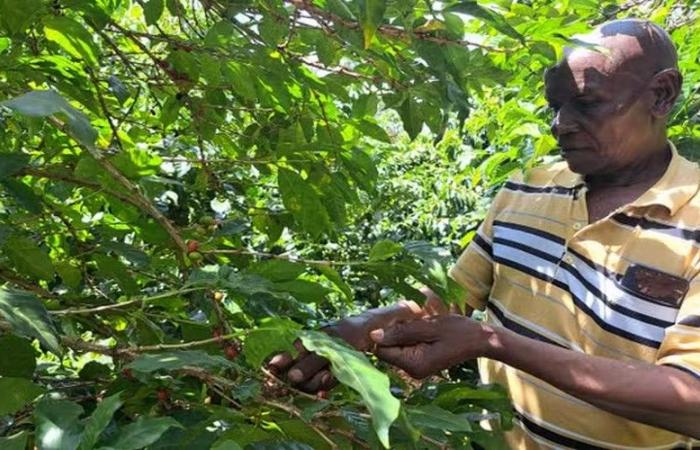Kenya’s coffee sector, crucial to the country’s economy and the livelihood of nearly 800,000 households, is facing a major crisis due to climate change. In the space of three decades, national production has fallen by almost 70%, from 130,000 to 40,000 tonnes, impacting not only local producers, but also exports to Europe, which constitutes the main market.
Climate change: a devastating impact
Tuesday January 14, 2025, in Gatura, a village located in the Aberdare mountains, in central Kenya, the situation is alarming. In this small village, Robert and Millicent Wanyaga, coffee producers for years, have noticed a dramatic drop in their production. Their plantation, once thriving with 400 coffee trees, now produces only a fraction of what it generated before 2019. The unstable climate, characterized by extreme temperatures and sudden changes in seasons, has had a direct impact on the yield of coffee trees. “Before 2019, each tree produced 12.5 kg of coffee, now it is barely 3 kg,” explains Mr. Wanyaga, 72 years old.
Climate uncertainty and coffee berry disease
The effects of climate change are not limited to reductions in yield. They also include new diseases, such as “coffee berry disease,” caused by excessively low temperatures. Eunice Maina, a 76-year-old experienced farmer, says she lost a harvest due to the severe frost that affected her coffee trees. In response, it opted for more resistant varieties such as Ruiru 11 and Batian, which prove more adapted to the new climatic conditions. These varieties offer good yields despite the challenges posed by the climate.
Adaptation to an increasingly extreme climate
Coffee producers, like Lawrence Wamuya, 45, are seeking to adapt to new climatic conditions. To compensate for the increasingly intense heat waves from December to March, some producers have started growing banana trees between the coffee trees. These trees act as natural parasols, providing shade and protecting plants from extreme temperatures. However, these strategies remain insufficient in the face of irregular rainfall and high water demand, making more efficient irrigation systems necessary.
The need for irrigation and political support
-Lack of water, compounded by the disappearance of small local rivers, is another major problem for farmers. The high cost of irrigation systems and the lack of political support hamper the implementation of sustainable solutions. “Without real political will, coffee producers will continue to suffer,” says Lawrence Wamuya. Despite these difficulties, some producers have chosen to diversify their crops by planting avocado and macadamia trees, thus offering a way to offset coffee-related losses.
The future of Kenya’s coffee sector
The coffee processing sector in Gatura, where beans are slowly dried under the sun, is also affected by these extreme weather conditions. In 2024, torrential rains disrupted the drying period, compromising the quality of the coffee. Charles Njure, the manager of the processing plant, dreams of building a solar dryer, a system capable of drying grains even during rainy periods. This would provide a more resilient solution to increasingly unpredictable weather conditions.
A structural crisis to be responded to urgently
The Kenyan coffee sector is at a turning point. Producers, faced with a drastic drop in their yields and increasingly difficult climatic conditions, are fighting to survive. The government, as well as private actors, must invest in irrigation solutions, modern infrastructure and suitable coffee varieties to save a key sector of the Kenyan economy.
Moctar FICUU / VivAfrik






